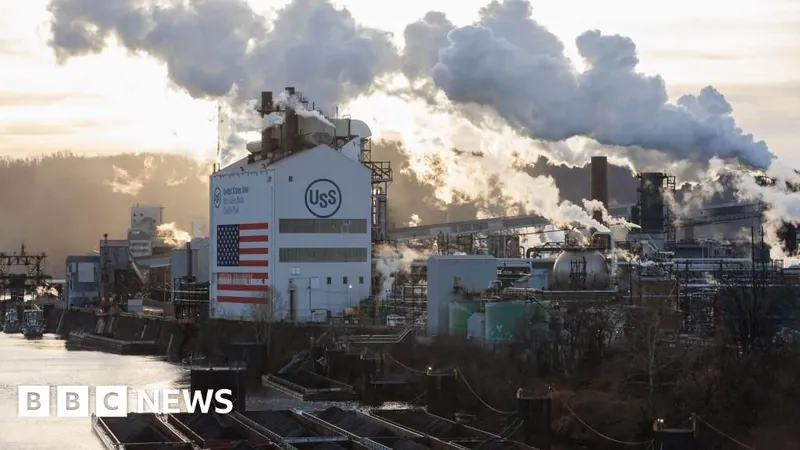
Biden Denies Nippon Steel's Bid for US Steel: What This Means for America and Japan
2025-01-04
Author: Liam
Introduction
In a bold move resonating through trade circles, President Joe Biden has officially blocked Japan's Nippon Steel from acquiring US Steel. This decision marks a significant fulfillment of Biden's political commitments, albeit amidst rising concerns over the repercussions for US-Japan relations and the potential deterrent effect on foreign investments in the American market.
Biden's Rationale for the Decision
Biden's rationale for halting the $14.9 billion deal centers around national security concerns. He emphasized that maintaining American ownership of critical industries—like steel production—is vital to safeguarding vital supply chains. 'A strong domestically owned and operated steel industry represents an essential national security priority and is critical for resilient supply chains,' Biden stated, underlining the strategic importance of steel for infrastructure, the auto industry, and national defense.
Union Support and Company Responses
The decision came after intense lobbying from the United Steelworkers union, which expressed vehement opposition to the proposed takeover due to fears it could endanger American jobs and compromise industry resilience. The union praised Biden's move as a step towards ensuring a robust future for American steelworkers.
In response to the announcement, Nippon Steel and US Steel expressed their discontent, indicating they felt the review process had been unfairly manipulated for political purposes. The two companies warned they would engage in 'appropriate action to protect their legal rights,' hinting at potential legal battles to come.
Impact on US-Japan Relations
Japanese officials have voiced deep disappointment with the Biden administration's stance. Yoji Muto, Japan's Minister of Economy, Trade, and Industry, emphasized that there are growing anxieties within Japanese business sectors about the future of cross-border investments, a sentiment echoed by various economic analysts. This sentiment highlights the delicate balance that Biden must maintain between domestic priorities and international alliances, particularly with such a crucial partner as Japan.
Concerns for the American Steel Industry
The deal's collapse represents not just a setback for Nippon Steel's ambitions but raises urgent questions about the future landscape of the American steel industry. Once a beacon of American industrial power, US Steel is facing existential challenges, threatening layoffs and potential factory closures without significant investment. Only recently, the companies had presented initiatives to preserve jobs and provide workforce training, attempting to assuage concerns among stakeholders.
Future Implications and Speculations
As political winds change, the road ahead appears uncertain. Analysts speculate on whether this decision will close the door for Nippon Steel altogether or if it could pave the way for a revamped proposal under a different administration, particularly with the potential of a Trump presidency looming on the horizon. BJP’s opposition to the deal suggests a bifurcation in the political narrative surrounding foreign investment, pitting national security interests against global market dynamics.
Market Reaction and Outlook
Despite the immediate fallout—US Steel shares plummeting over 5% post-announcement—some experts suggest this could be just the beginning of a longer negotiation process. The Committee on Foreign Investment in the United States retains the option to revise the timeline, allowing for potential future dialogue.
Conclusion
In summary, Biden's denial of the Nippon Steel bid may serve immediate political ends and bolster domestic interests, but the reverberations of this decision may challenge the United States' relationships with its allies and impact foreign investment perceptions for years to come. The question now looms: how will the Biden administration navigate this complex web of international trade and domestic responsibility going forward?



 Brasil (PT)
Brasil (PT)
 Canada (EN)
Canada (EN)
 Chile (ES)
Chile (ES)
 Česko (CS)
Česko (CS)
 대한민국 (KO)
대한민국 (KO)
 España (ES)
España (ES)
 France (FR)
France (FR)
 Hong Kong (EN)
Hong Kong (EN)
 Italia (IT)
Italia (IT)
 日本 (JA)
日本 (JA)
 Magyarország (HU)
Magyarország (HU)
 Norge (NO)
Norge (NO)
 Polska (PL)
Polska (PL)
 Schweiz (DE)
Schweiz (DE)
 Singapore (EN)
Singapore (EN)
 Sverige (SV)
Sverige (SV)
 Suomi (FI)
Suomi (FI)
 Türkiye (TR)
Türkiye (TR)
 الإمارات العربية المتحدة (AR)
الإمارات العربية المتحدة (AR)